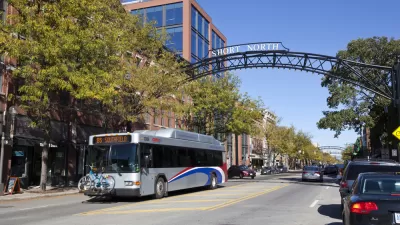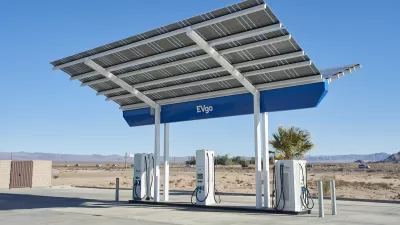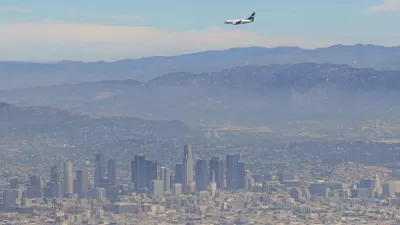San Antonio's soon-to-be-adopted air quality plan will focus on transportation to reduce the city's air pollution.
Scott Huddleston reports that the San Antonio City Council "is moving toward adopting an air quality plan in November that includes measures the city has studied for years, including anti-idling restrictions for cars, trucks and train engines" in response to a report finding the second worse air quality in the state for the past three years. Only Dallas-Fort Worth rated worse.
"Under methods applied by the Texas Commission on Environmental Quality, San Antonio had a three-year average for ozone of 80 parts per billion, compared with 81 ppb in the Dallas area and 80 in Houston — the other Texas city in noncompliance," adds Huddleston.
San Antonio has a recorded value of 74 ppb, just below the current EPA standard of 75 ppb, during the 2015 ozone season. The EPA is expected to adopt a more stringent standard of 60 to 70 ppb as early as October, when the 2015 season ends.
In addition to the details about the current ratings of San Antonio, in context with the other major Texas metropolitan areas, Huddleston also provides more details about the city's air quality plan:
"In preparing its air quality plan, the city has worked with Environ, a consultant contracted by the TCEQ. The city estimates San Antonio can eliminate 354 tons annually of nitrogen oxides, a key culprit in smog formation, through local transportation strategies that encourage car-pooling, bicycling, bus transit and other commuter habits that reduce exhausts."
FULL STORY: ‘Sense of urgency’ noted on air quality

Study: Maui’s Plan to Convert Vacation Rentals to Long-Term Housing Could Cause Nearly $1 Billion Economic Loss
The plan would reduce visitor accommodation by 25,% resulting in 1,900 jobs lost.

North Texas Transit Leaders Tout Benefits of TOD for Growing Region
At a summit focused on transit-oriented development, policymakers discussed how North Texas’ expanded light rail system can serve as a tool for economic growth.

Why Should We Subsidize Public Transportation?
Many public transit agencies face financial stress due to rising costs, declining fare revenue, and declining subsidies. Transit advocates must provide a strong business case for increasing public transit funding.

Alabama: Trump Terminates Settlements for Black Communities Harmed By Raw Sewage
Trump deemed the landmark civil rights agreement “illegal DEI and environmental justice policy.”

Dear Tesla Driver: “It’s not You, It’s Him.”
Amidst a booming bumper sticker industry, one writer offers solace to those asking, “Does this car make me look fascist?”

A Visual Celebration of Manhattan’s Chinatown Elder Community, Through Food
Lanterns, cafeteria trays, and community connection take center stage in this stunning photo essay.
Urban Design for Planners 1: Software Tools
This six-course series explores essential urban design concepts using open source software and equips planners with the tools they need to participate fully in the urban design process.
Planning for Universal Design
Learn the tools for implementing Universal Design in planning regulations.
City of Santa Clarita
Ascent Environmental
Institute for Housing and Urban Development Studies (IHS)
City of Grandview
Harvard GSD Executive Education
Toledo-Lucas County Plan Commissions
Salt Lake City
NYU Wagner Graduate School of Public Service





























